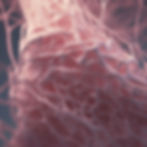STELLA AMPATZI
DYSAUTONOMIC NETWORKS vs
AUTONOMIC NETWORKS
Part 01
Dysautonomic Networks is a digital art
project that aims to shed light to autonomic nervous system disorders. Dysautonomia, refer to a group of conditions characterized by
dysfunction or damage to the autonomic nervous system (ANS). The ANS is responsible for regulating and controlling involuntary bodily functions, such as heart rate, blood pressure, digestion, temperature control, and the body’s stress response.
The purpose of my art project is to raise awareness about autonomic diseases and advocate for increased funding towards research for this health issue that affects millions of people. Through my art, I shed light on the challenges faced by individuals living with autonomic diseases and emphasize the importance of supporting research efforts to find better treatments and potential cures.
Part 02
Autonomic networks refer to self-managing or self-organizing networks that can operate and adapt without direct human intervention. In the context of warfare, the use of drones in conjunction with autonomic networks has gained attention and interest in recent years.
Autonomous drones, also known as unmanned aerial vehicles (UAVs), are aircraft that can operate without an onboard pilot. They can be remotely controlled or operate autonomously through pre-programmed instructions or artificial intelligence algorithms. Autonomic networks can enhance the capabilities of drones by allowing them to communicate, coordinate, and make decisions collectively, leading to improved efficiency and adaptability in warfare scenarios.
The choice of color and essence in this artwork symbolically represents the concept of the womb, evoking the notion that this technology is still in its embryonic phase. However, it also conveys the idea that the development and proliferation of this technology are advancing rapidly and seemingly beyond control.
ARTIST STATEMENT
Through this art installation, my intention is to raise awareness about the ethical, legal, and safety concerns associated with the deployment of autonomous drones and autonomic networks in warfare.
It is crucial to emphasize that the use of these technologies should be approached with caution and in accordance with international laws and regulations. Adequate oversight and accountability mechanisms must be in place to ensure their responsible and lawful utilization in military operations.
By highlighting these considerations, I aim to foster a deeper understanding of the potential implications and encourage responsible decision-making regarding the use of autonomous drones and autonomic networks in warfare.
By juxtaposing these two works: DYSAUTONOMIC vs Autonomic NETWORKS, my intention is to draw attention to the stark contrast between the funding allocated for dysautonomic diseases and the funding dedicated to the development of autonomic networks in warfare.
The purpose is to emphasize the disparity and raise awareness about the discrepancies in financial support between these two areas.


















